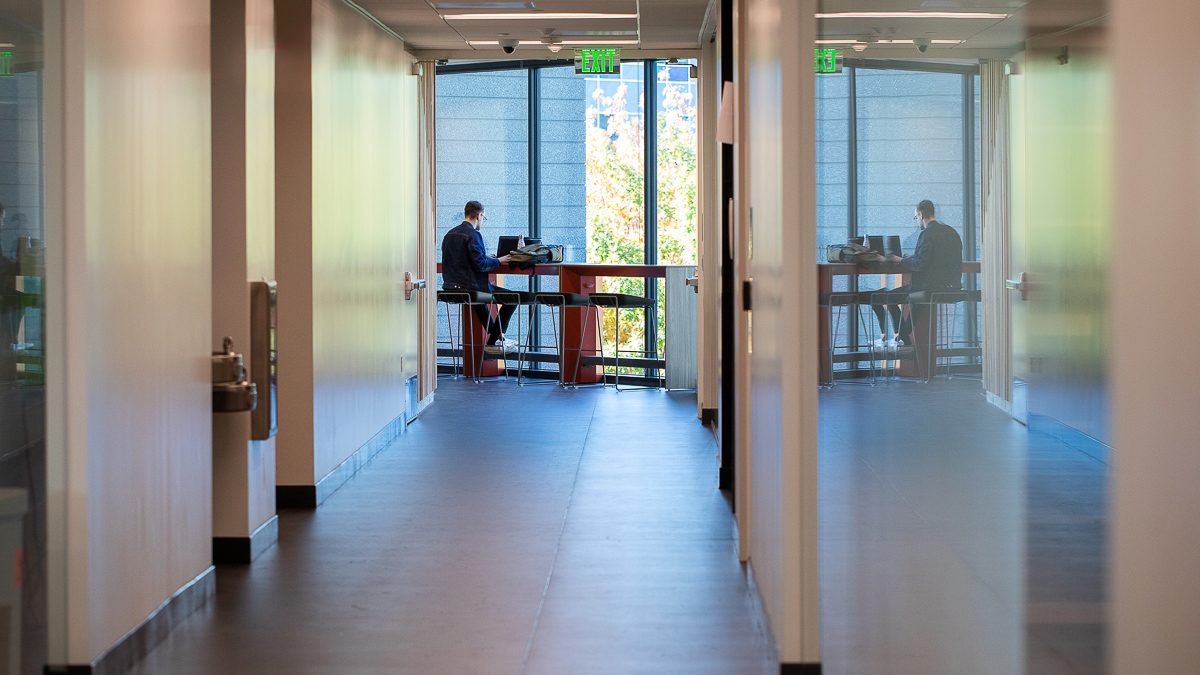 Most STEM students responding to a survey this summer indicated that, despite disruptions in class delivery caused by measures required to slow the spread of COVID-19, they would continue to pursue their degrees even if all classes were held online. (Sacramento State/Andrea Price)
Most STEM students responding to a survey this summer indicated that, despite disruptions in class delivery caused by measures required to slow the spread of COVID-19, they would continue to pursue their degrees even if all classes were held online. (Sacramento State/Andrea Price)
By Cynthia Hubert
When their classes and labs suddenly pivoted to a virtual format in March, most Sacramento State STEM students had rarely if ever taken an online college course.
The switch, deemed necessary to contain the spread of the coronavirus, proved stressful for many, a new survey shows. But science, technology, engineering and mathematics students are, by and large, committed to finishing their degrees regardless of whether future classes are held online or face to face, according to the study.
Researchers hope the survey will help faculty continue to craft online courses for the fall semester that students find most engaging and less anxiety-provoking.
- Fall semester opens with focus on safety, student success
- Sac State ranked among nation's top universities
“Hopefully everyone will feel more comfortable now that most have had the experience of taking classes online,” said Biology student Eric Pennino, who conducted the study under the supervision of Biology Professor Kelly McDonald, Mathematics & Statistics Professor Sayonita Ghosh Hajra, and Environmental Studies Professor Catherine Ishikawa.
The survey explored how STEM students responded to the disruption in their coursework, and their feelings about the sudden shift to online learning. The work was part of Sac State’s Summer Undergraduate Research Experience, in which faculty members and undergraduate students collaborate on research or other scholarly projects.
A total of 425 STEM students and 12 instructors responded to the survey, conducted in early May.
The researchers found that 38% of students who responded had never taken an online course, and 39% had taken only one or two virtual college classes.
The abrupt shift to strictly online learning had a significant effect on their learning experiences and feelings about their studies, the survey found.
Yet 72% said they would return to Sacramento State in Fall 2020 to continue pursuing their degrees even if all classes were held online. The vast majority of courses will be held virtually this semester.
“I was very nervous about the switch to online,” said Pennino, who is entering his senior year and is planning to enroll in graduate school at Sac State. “I didn’t see how labs could be done very well virtually.
“But it went smoother than I thought it would. It’s difficult, but the faculty is doing everything possible to make it the best that it can be for students.”
Although a large majority of students became comfortable within a few weeks with technologies needed for their classes, 43% said the pandemic and its fallout made them less enthusiastic about pursuing a STEM degree, and 66% said they felt less engaged with course material.
McDonald, director of Sac State’s Center for Science and Math Success, has been working with students to deal with the anxiety associated with the pandemic. Students reported that they have been having trouble sleeping, that studying and learning in cramped spaces at home is a challenge and that they are feeling depressed and anxious. She and other STEM faculty members have made a point of talking to students about their issues and offering more flexibility in their studies.
In the May survey, instructors said one of their biggest issues with online teaching was unstable internet or Wi-Fi for themselves or their students. A majority said they were communicating regularly with their students and being more flexible with assignments and deadlines in the interest of reducing stress.
Pennino said he has mixed feelings about studying online again this fall semester.
“The drawback is that it’s hard to build engagement with other students, and even with the faculty,” he said. But professors have become adept at delivering lectures in creative new ways, he said.
“Lots of faculty members now record their lectures, which for me is really helpful because I can go back and review them online. That’s one of the biggest positives for me.”
For a copy of the full report on “COVID-19’s Disruption to Undergraduate STEM Students and Instructors,” contact Eric Pennino at epennino@csus.edu.
